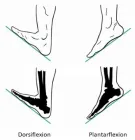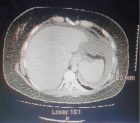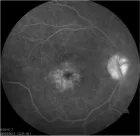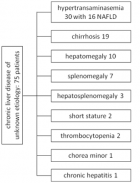Abstract
Research Article
Atherogenic risk assessment of naive HIV-infected patients attending Infectious Diseases Service of Kinshasa University Teaching Hospital, Democratic Republic of the Congo (DRC)
MMK Mbula*, HNT Situakibanza, GL Mananga, B Longo Mbenza, JRR Makulo, MM Longokolo, MN Mandina, NN Mayasi, MM Mbula, B Bepouka, GL Mvumbi, EN Amaela, DN Tshilumba, O Odio, BM Ekila, A Nkodila and BT Buasa
Published: 13 October, 2020 | Volume 3 - Issue 1 | Pages: 040-048
Background and aim: Metabolic abnormalities are common in HIV/AIDS. Increasingly, lipid ratios are used as screening tools for dyslipidaemia in these medical conditions. The aim of this study was to assess the ability of 4 lipid ratios to predict cardiovascular risks.
Methods: This is a cross-sectional and analytical study included 105 HIV+ patients followed in Kinshasa University Teaching Hospital (KUTH). Four indices [Atherogenic Index of Plasma (AIP), Castelli Risk Index (CRI) I and II, Atherogenic coefficient (AC)] were compared. Statistical analyzis consisted of measuring frequencies and means, Student’s t-tests, ANOVA and Ficher’s exact test, and the calculation of the Kappa value.
Results: Lipid ratios predicted respectively the risk in 62% (AIP), 28.6% (CRI-I) and 23.8% (CRI-II). CRI-I and II were elevated, especially in women. The AIP appeared to be a better predictor than CRI-I and II to assess dyslipidaemia in general and the high-risk frequency. The cholesterol detected risk in 66.7% (Low HDL-C), 50% (High LDL-C), 38.9% (High TC and/or TG).
The atherogenic risk was higher with age, advanced WHO stage, HIV-TB, HBV-HCV co-infections, smoking and alcohol intake. Haemoglobin (Hb) and CD4 counts were low when the risk was high. Age ≥ 50 years, stage 4 (WHO), CD4s+ ≤ 200 cells/µL were independent factors associated with atherogenic risk.
Conclusion: Lipid ratios can be used as reliable tools for assessing cardiovascular risk of naïve HIV-infected patients who received HAART.
Read Full Article HTML DOI: 10.29328/journal.ijcmbt.1001015 Cite this Article Read Full Article PDF
Keywords:
HIV; Cardiovascular risks Assessment; Lipid ratios; Kinshasa; DRCongo
References
- Deeks S, Lewin SR, Havlir DV. The end of AIDS infection as a chronic disease. The Lancet. 2013; 382: 1525-1533. PubMed: https://pubmed.ncbi.nlm.nih.gov/24152939/
- Serrano-Villar S, Gutiérrez F, Miralles C, Berenguer J, Rivero A, et al. Human Immunodeficiency Virus as a Chronic Disease: Evaluation and Management of Nonacquired Immune Deficiency Syndrome-Defining Conditions. Open Forum Infect Dis. 2016; 3: 097. PubMed: https://pubmed.ncbi.nlm.nih.gov/27419169/
- Pirillo A, Catapano AL, Norata GD. HDL in Infectious Diseases and Sepsis. In: von Eckardstein A., Kardassis D. (eds) High Density Lipoproteins. Handbook of Experimental Pharmacology. 2015; 224: 483-508. PubMed: https://pubmed.ncbi.nlm.nih.gov/25522999/
- Feingold KR, Grunfeld C. The Effect of Inflammation and Infection on Lipids and Lipoproteins. [Updated 2019 Jan 8]. In: Feingold KR, Anawalt B, Boyce A, et al., editors. Endotext [Internet]. South Dartmouth (MA): MDText.com, Inc.; 2000. PubMed: https://www.ncbi.nlm.nih.gov/books/NBK326741/
- Reis RP. Cardiovascular Risk in HIV-infected patient. Rev Port Cardiol. 2019; 38: 471- 472. PubMed: https://www.ncbi.nlm.nih.gov/pmc/articles/PMC3964878/
- Currier JS, Hsue PY. The Role of Inflammation in HIV-Associated Atherosclerosis—One Size May Not Fit All. J Infect Dis. 2020; 221: 495-497. PubMed: https://pubmed.ncbi.nlm.nih.gov/31077267/
- Abutaleb A, Feinstein MJ. Coranary Artery Disease in HIV. 2020. https://www.acc.org/latest-in-cardiology/articles/2018/01/18/08/57/coronary-artery-disease-in-hiv
- Hsue PY, Waters DD. HIV infection and coronary heart disease: mechanisms and management. Nature Rev Cardiol. 2019; 16: 745–759. PubMed: https://pubmed.ncbi.nlm.nih.gov/31182833/
- Seecheran VK, Giddings SL, Seecheran NA. Acute coronary syndromes in patients with HIV. Coronary Artery Disease. 2017; 28: 166-172. PubMed: https://pubmed.ncbi.nlm.nih.gov/27845996/
- Raposo MA, Armiliato GN, Guimarães NS, Caram CA, Silveira RD, et al. Metabolic disorders and cardiovascular risk in people living with HIV/AIDS without the use of antiretroviral therapy. Rev. Soc. Bras. Med. Trop. 2017 50: 598-606. http://www.scielo.br/scielo.php?script=sci_arttext&pid=S0037-86822017000500598&lng=en
- Kumar S, Dhanawal. Central obesity & dyslipidemia in HIV patients on antiretroviral therapy. Indian J Med Res. 2018; 148: 366–368. PubMed: https://pubmed.ncbi.nlm.nih.gov/30665998/
- Cerrato E, Calcagno A, D'Ascenzo F, et al. Cardiovascular disease in HIV patients: from bench to bedside and backwards. Open Heart. 2015; 2: e000174. PubMed: https://pubmed.ncbi.nlm.nih.gov/25815207/
- Policarpo S, Rodrigues T, Moreira AC, Valadas E. Cardiovascular risk in HIV-infected individuals: A comparison of three risk prediction algorithms. Rev Port Cardiol. 2019; 38: 463-470. PubMed: https://pubmed.ncbi.nlm.nih.gov/31522936/
- Touloumi G, Kalpourtzi N, Papastamopoulos V, et al. Cardiovascular risk factors in HIV infected individuals: Comparison with general adult control population in Greece. PLoS One. 2020; 15: e0230730. PubMed: https://pubmed.ncbi.nlm.nih.gov/32226048/
- Krikke M, Hoogeveen RC, Hoepelman AI, Visseren FL, Arends JE. Cardiovascular risk prediction in HIV-infected patients: comparing the Framingham, atherosclerotic cardiovascular disease risk score (ASCVD), Systematic Coronary Risk Evaluation for the Netherlands (SCORE-NL) and Data Collection on Adverse Events of Anti-HIV Drugs (D:A:D) risk prediction models. HIV Medicine. 2016; 17: 289-297. PubMed: https://pubmed.ncbi.nlm.nih.gov/26268806/
- Bittencourt MS. Estimating Cardiovascular risk in HIV-Infected Patients. Arq Bras Cardiol. 2020; 114: 76–77. PubMed: https://pubmed.ncbi.nlm.nih.gov/32049173/
- Silva AG, Paulo RV, Silva-Vergara ML. Subclinical Carotid Atherosclerosis and Reduced DAD Score for Cardiovascular Risk Stratification in HIV-Positive Patients. Arq Bras Cardiol. 2020; 114: 68-75. PubMed: https://pubmed.ncbi.nlm.nih.gov/31664317
- Schoepf IC, Buechel RR, Kovari H, Hammoud DA, Tarr PE. Subclinical Atherosclerosis Imaging in People Living with HIV. J Clin Med. 2019; 8: 1125. PubMed: https://pubmed.ncbi.nlm.nih.gov/31362391/
- Hanna DB, Guo M, žková PB, et al. HIV Infection and Carotid Artery Intima-media Thickness: Pooled Analyses Across 5 Cohorts of the NHLBI HIV-CVD Collaborative. Clin Infect Dis. 2016; 63: 249–256. PubMed: https://pubmed.ncbi.nlm.nih.gov/27118787/
- Osegbe D, Soriyan OO, Ogbenna AA, Okpara HC, Azinge EC. Risk factors and assessment for cardiovascular disease among HIV-positive patients attending a Nigerian tertiary hospital Ifeyinwa. Pan African Med J. 2016; 23: 206. PubMed: https://www.ncbi.nlm.nih.gov/pmc/articles/PMC4907765/
- Noumegni SR, Nansseu JR, Bigna JJ, et al. Atherogenic index of plasma and 10-year risk of cardiovascular disease in adult Africans living with HIV infection: A cross-sectional study from Yaoundé, Cameroon. JRSM Cardiovasc Dis. 2017; 6: 2048004017740478. PubMed: https://pubmed.ncbi.nlm.nih.gov/29435266/
- Onyedum CC, Young EE, Iroezindu MO, Chukwuka CJ, Nwagha UI. Atherogenic index of plasma in highly active antiretroviral therapy-naïve patients with human immunodeficiency virus infection in Southeast Nigeria. Indian J Endocrinol Metab. 2014; 18: 631-636. PubMed: https://pubmed.ncbi.nlm.nih.gov/25285278/
- Adedokun AK, Olisekodiaka MJ, Adeyeye DA, et al. Castelli Risk Index, Atherogenic Index of Plasma, and Atherogenic Coefficient: Emerging Risk Predictors of Cardiovascular Disease in HIV-Treated Patients. Int J Clin Trials Case Stud. 2017; 2: 8-15.
- Noumegni, SR, Ama VJM, Assah, FK. et al. Assessment of the agreement between the Framingham and DAD risk equations for estimating cardiovascular risk in adult Africans living with HIV infection: a cross-sectional study. Trop Dis Travel Med Vaccines. 2017; 3: 12. PubMed: https://pubmed.ncbi.nlm.nih.gov/28883982/
- Mbula MMK, Situakibanza HNT, Lelo GM, Mbenza bl, Makulo JRR, et al. Lipid profile of antiretroviral therapy-naive HIV-infected patients attending infectious diseases service of University Teaching Hospital of Kinshasa, Democratic Republic of the Congo (DRC). Int J Clin Virol. 2020; 4: 102-108. https://www.heighpubs.org/hjcv/ijcv-aid1023.php
- Bekolo CE, Nguena MB, Ewane L, Bekoule PS, Kollo B. The lipid profile of HIV-infected patients receiving antiretroviral therapy in a rural Cameroonian population. BMC Public Health. 2014; 14: 236. PubMed: https://pubmed.ncbi.nlm.nih.gov/24606888/
- Singh M, Pathak MS, Paul A. A Study on Atherogenic Indices of Pregnancy Induced Hypertension Patients as Compared to Normal Pregnant Women. J Clin Diagn Res. 2015; 9: BC05-BC8. PubMed: https://pubmed.ncbi.nlm.nih.gov/26393117/
- Nimmanapalli HD, Kasi AD, Devapatla PK, Nuttakki V. Lipid ratios, atherogenic coefficient and atherogenic index of plasma as parameters in assessing cardiovascular risk in type 2 diabetes mellitus. Int J Res Med Sci. 2016; 4: 2863-2869.
- Bo MS, Cheah WL, Lwin S, New TM, Win TT, Aung M. Understanding the Relationship between Atherogenic Index of Plasma and Cardiovascular Disease Risk Factors among Staff of an University in Malaysia. J Nutrit Metabol. 2018; Article ID 7027624; 6.
- Sujatha R, Kavitha S. Atherogenic indices in stroke patients: A retrospective study. Iran J Neurol. 2017; 16: 78-82. PubMed: https://www.ncbi.nlm.nih.gov/pmc/articles/PMC5526781/
- Olamoyegun MA, Oluyombo R, Asaolu SO. Evaluation of dyslipidemia, lipid ratios, and atherogenic index as cardiovascular risk factors among semi-urban dwellers in Nigeria. Ann Afr Med. 2016; 15: 194–199. PubMed: https://pubmed.ncbi.nlm.nih.gov/27853034/
- HIV info.NIH.gov. HIV and older people. 2020. https://hivinfo.nih.gov/understanding-hiv/fact-sheets/hiv-and-older-people
Figures:

Figure 1

Figure 2
Similar Articles
-
Oral Candida colonization in HIV-infected patients: Species and antifungal susceptibility in Tripoli/LibyaEllabib M*,Mohamed H,Mokthar E,Ellabib M,El Magrahi H,Eshwika A. Oral Candida colonization in HIV-infected patients: Species and antifungal susceptibility in Tripoli/Libya . . 2018 doi: 10.29328/journal.ijcmbt.1001001; 1: 001-008
-
Atherogenic risk assessment of naive HIV-infected patients attending Infectious Diseases Service of Kinshasa University Teaching Hospital, Democratic Republic of the Congo (DRC)MMK Mbula*,HNT Situakibanza,GL Mananga,B Longo Mbenza, JRR Makulo,MM Longokolo,MN Mandina,NN Mayasi,MM Mbula,B Bepouka,GL Mvumbi,EN Amaela,DN Tshilumba,O Odio,BM Ekila,A Nkodila,BT Buasa. Atherogenic risk assessment of naive HIV-infected patients attending Infectious Diseases Service of Kinshasa University Teaching Hospital, Democratic Republic of the Congo (DRC). . 2020 doi: 10.29328/journal.ijcmbt.1001015; 3: 040-048
-
The clinicopathological correlates of Cystoisosporiasis in immunocompetent, immunocompromised and HIV-infected/AIDS patients, but neglected in SARS-COV-2/COVID-19 patients?Chrysanthus Chukwuma Sr*. The clinicopathological correlates of Cystoisosporiasis in immunocompetent, immunocompromised and HIV-infected/AIDS patients, but neglected in SARS-COV-2/COVID-19 patients?. . 2021 doi: 10.29328/journal.ijcmbt.1001018; 4: 001-004
-
Trends of Antibiotic Resistance among Uropathogens in Medical vs. Non-Medical Departments of Al-Shifa Medical Complex in Gaza Strip: A Retrospective, Cross-Sectional StudyKhaled Alkhodari*, Yasmin Al-Shurafa, Hammam AL-louh, Rafat Lubbad. Trends of Antibiotic Resistance among Uropathogens in Medical vs. Non-Medical Departments of Al-Shifa Medical Complex in Gaza Strip: A Retrospective, Cross-Sectional Study. . 2024 doi: 10.29328/journal.ijcmbt.1001028; 7: 001-005
-
The Bacteriological Profile of Nosocomial Infections at the Army Central Hospital of BrazzavilleMedard Amona*,Yolande Voumbo Matoumona Mavoungou,Hama Nemet Ondzotto,Benjamin Kokolo,Armel Itoua,Gilius Axel Aloumba,Pascal Ibata. The Bacteriological Profile of Nosocomial Infections at the Army Central Hospital of Brazzaville. . 2025 doi: 10.29328/journal.ijcmbt.1001032; 8: 009-022
Recently Viewed
-
A Resurgence of the Idea of Hypertriglyceridemia and Lower Serum (HDL-C) as Predictive Factors for Insulin Resistance (IR) & Type 2 Diabetes Mellitus Development: A Narrative ReviewKulvinder Kochar Kaur*. A Resurgence of the Idea of Hypertriglyceridemia and Lower Serum (HDL-C) as Predictive Factors for Insulin Resistance (IR) & Type 2 Diabetes Mellitus Development: A Narrative Review. New Insights Obes Gene Beyond. 2025: doi: 10.29328/journal.niogb.1001022; 9: 001-012
-
Novel Mutation in Famous Gene Diseases in Red Blood CellsMahdi Nowroozi*. Novel Mutation in Famous Gene Diseases in Red Blood Cells. New Insights Obes Gene Beyond. 2025: doi: 10.29328/journal.niogb.1001023; 9: 013-020
-
Physical Performance in the Overweight/Obesity Children Evaluation and RehabilitationCristina Popescu, Mircea-Sebastian Șerbănescu, Gigi Calin*, Magdalena Rodica Trăistaru. Physical Performance in the Overweight/Obesity Children Evaluation and Rehabilitation. Ann Clin Endocrinol Metabol. 2024: doi: 10.29328/journal.acem.1001030; 8: 004-012
-
The Role of Genetic Mutations in the HPGD & SLCO2A1 Genes in Pachydermoperiostosis SyndromeShahin Asadi*,Arezo Zare,Sima Koohestani. The Role of Genetic Mutations in the HPGD & SLCO2A1 Genes in Pachydermoperiostosis Syndrome. J Genet Med Gene Ther. 2025: doi: 10.29328/journal.jgmgt.1001013; 8: 001-005
-
Estimation of Radiation Dose to Blood Vessels and Components from Medical Imaging Procedures: Current StatusKhalid M Aloufi*. Estimation of Radiation Dose to Blood Vessels and Components from Medical Imaging Procedures: Current Status. Arch Vas Med. 2025: doi: 10.29328/journal.avm.1001020; 9: 001-002
Most Viewed
-
Causal Link between Human Blood Metabolites and Asthma: An Investigation Using Mendelian RandomizationYong-Qing Zhu, Xiao-Yan Meng, Jing-Hua Yang*. Causal Link between Human Blood Metabolites and Asthma: An Investigation Using Mendelian Randomization. Arch Asthma Allergy Immunol. 2023 doi: 10.29328/journal.aaai.1001032; 7: 012-022
-
Impact of Latex Sensitization on Asthma and Rhinitis Progression: A Study at Abidjan-Cocody University Hospital - Côte d’Ivoire (Progression of Asthma and Rhinitis related to Latex Sensitization)Dasse Sery Romuald*, KL Siransy, N Koffi, RO Yeboah, EK Nguessan, HA Adou, VP Goran-Kouacou, AU Assi, JY Seri, S Moussa, D Oura, CL Memel, H Koya, E Atoukoula. Impact of Latex Sensitization on Asthma and Rhinitis Progression: A Study at Abidjan-Cocody University Hospital - Côte d’Ivoire (Progression of Asthma and Rhinitis related to Latex Sensitization). Arch Asthma Allergy Immunol. 2024 doi: 10.29328/journal.aaai.1001035; 8: 007-012
-
An algorithm to safely manage oral food challenge in an office-based setting for children with multiple food allergiesNathalie Cottel,Aïcha Dieme,Véronique Orcel,Yannick Chantran,Mélisande Bourgoin-Heck,Jocelyne Just. An algorithm to safely manage oral food challenge in an office-based setting for children with multiple food allergies. Arch Asthma Allergy Immunol. 2021 doi: 10.29328/journal.aaai.1001027; 5: 030-037
-
Snow white: an allergic girl?Oreste Vittore Brenna*. Snow white: an allergic girl?. Arch Asthma Allergy Immunol. 2022 doi: 10.29328/journal.aaai.1001029; 6: 001-002
-
Cytokine intoxication as a model of cell apoptosis and predict of schizophrenia - like affective disordersElena Viktorovna Drozdova*. Cytokine intoxication as a model of cell apoptosis and predict of schizophrenia - like affective disorders. Arch Asthma Allergy Immunol. 2021 doi: 10.29328/journal.aaai.1001028; 5: 038-040

If you are already a member of our network and need to keep track of any developments regarding a question you have already submitted, click "take me to my Query."

















































































































































